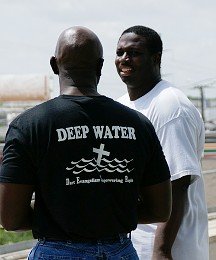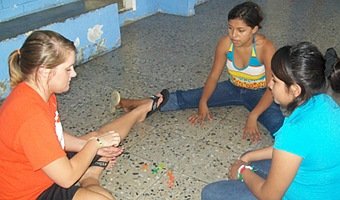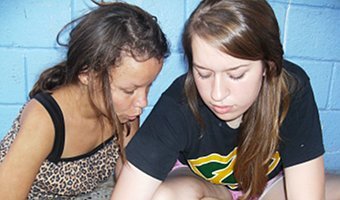EDE, Netherlands (ABP) — Despite a challenging financial outlook, Baptist World Alliance leaders have moved ahead with the election of a new division director, welcomed two additional member bodies and called for new initiatives in both intra-Baptist relations and Christian-Muslim dialogue.
Holding its annual meeting July 27-Aug. 1 in Ede, Netherlands, the BWA General Council also observed the 400th anniversary of the Baptist movement, which began in 1609 in nearby Amsterdam.
The council — governing body of the 37 million-member worldwide umbrella group for Baptists — also streamlined its operating procedures, nominated a new president for a five-year term beginning in 2010 and unveiled plans for its 20th Baptist World Congress, to be held next year in Hawaii.
|
Members of Dutch Baptist churches sell Gouda cheese, Delft pottery and other Dutch souvenirs to attendees at the BWA gathering in Ede, Netherlands. Proceeds from the sales will benefit Dutch Baptist ministries. (ABP photo)
|
About 360 council members, representing more than 50 countries, adopted a budget for 2010 of $2,348,365 — the same amount as a revised 2009 budget, which had been reduced by about 25 percent earlier this year.
“This has been a very difficult year for the BWA,” said Ellen Teague, the group's director of finance and administration, in introducing the budget July 31. The worldwide economic recession has had a highly negative impact on BWA’s investments, which have lost about $1.5 million of their value, she said.
The situation could have been even worse, Teague noted, but contributions to the organization were only slightly lower last year than the previous one.
“It’s remarkable to me that our donors have continued to support us even in times of personal difficulty,” she added.
“We felt it was unrealistic to expect increased revenue in 2010,” she said. “We took the reduced 2009 budget and used the same figures for 2010. This represents a zero increase in our budget for next year.”
BWA president David Coffey, whose term expires at the 2010 World Congress, encouraged members of member bodies’ more than 159,000 congregations to collect a “thank offering” to be presented when the BWA World Congress meets July 28-Aug. 1 in Honolulu.
In addition to providing much-needed financial assistance, the offering “will enable thousands of Baptists who are not in Hawaii to feel a part of the celebration,” said Coffey.
Despite the grim financial forecast, BWA General Secretary Neville Callam said he has “found unquestioned reasons to be encouraged.”
“We cannot find adequate words to give expression to our thankfulness,” he said. “Baptists of the world do have financial weaknesses, but God has truly blessed us.”
To ensure the BWA’s financial future, Callam announced a six-year fund-raising effort — the BWA 400 Legacy Fund. The fund, whose inauguration marks Baptists’ 400th anniversary, will solicit contributions from individuals and organizations “in multiples of four, 40, 400 or 4,000 units in the currency of their own nation,” he said. “All monies will be placed in a reserve fund to preserve the core mission of the Baptist World Alliance in times of economic instability and to provide seed money for new initiatives.”
In his report to the council, Callam also called for increased dialogue among Baptists and between Christians and Muslims.
A “Christian multicultural hermeneutic” is necessary for Baptists around the world to “understand the various cultures of participants in the BWA,” Callam asserted. “This speaks to how we understand each other and how we communicate with each other.”
“The discussion should clarify whether over the years certain norms have developed as to what is acceptable in the BWA that have chained us in a certain cultural captivity,” he added. “It should reduce tension when we gather in settings to seek consensus on difficult issues of concern to us.”
Callam noted BWA’s continuing engagement with “A Common Word Between Us and You,” a letter addressed to Christian leaders in 2007 by more than 130 Muslim scholars and religious and secular leaders. BWA representatives responded earlier this year with a document of their own.
“We have encouraged Baptist bodies to open conversations with Muslims in their neighborhood,” said Callam. “We wonder if there is a need to establish a mechanism at the global level to give expression to local dialogues.”
Callam said he hoped both initiatives would be considered by the General Council’s executive committee, which then could make recommendations for the council’s approval.
Raimundo Cesar Barreto Jr., a 42-year-old Brazilian pastor, was elected the first director of the BWA’s division of freedom and justice, which was created in 2008 to promote respect for human rights and religious liberty.
Barreto, currently pastor in Salvador, Brazil, and general coordinator of the Martin Luther King Jr. Center for Social Ethics there, has been an advocate for human rights and social justice across Latin America. He holds a doctor of philosophy degree in Christian social ethics from Princeton Theological Seminary and a master of divinity degree from McAfee School of Theology at Mercer University in Atlanta, as well as bachelor’s degrees from the North Brazil Baptist Theological Seminary in Recife.
Two new unions admitted by the General Council bring BWA’s total number of member bodies to 216. The Argentine Baptist Association and the Uganda Baptist Convention were accepted by unanimous vote. The Argentine association was formed in 2005 and includes 40 churches with about 5,000 members. The Uganda convention, organized in 2000, has more than 21,000 members in 366 churches.
Both organizations were formed following disagreements with older Baptist bodies in their respective countries, but Alistair Brown of Chicago, chair of the membership committee which recommended the two, said the conflicts have been resolved and that both older conventions recommended acceptance.
Constitutional and bylaw amendments adopted by the General Council will give broader responsibilities to its executive committee and make it “more deliberative.” The changes reduced the committee’s membership from more than 60 to 25 and dropped the number of vice presidents from 19 to 12 — two nominated from each of the BWA’s six regions. For the first time, one of the vice presidents will be designated first vice president. Except for the first vice president, none of the vice presidents will sit on the executive committee.
Program committees will no longer have governance functions, but will serve as advisory panels to BWA directors. In addition, a new nominations committee will replace the officers search committee and will propose names for the president and vice presidents and members of committees and commissions — the BWA’s primarily forum for considering theological, historical and ethical issues.
John Upton, executive director of the Baptist General Association of Virginia, was nominated by the council to be president of the BWA. If elected at the World Congress in Hawaii, Upton will serve a five-year term to end in 2015.
Upton, who also chairs the Baptist World Congress program committee, announced a slate of speakers for the 2010 event, whose theme will be “Hear the Spirit.” In addition to outgoing BWA president David Coffey, speakers will include Karl Johnson, general secretary of the Jamaica Baptist Union; Paul Msiza, president of the All Africa Baptist Fellowship and general secretary of the Baptist Convention of South Africa; Alongla Aier, a founder and professor at the Oriental Theological Seminary in the Indian state of Nagaland; and Lance Watson, senior pastor of St. Paul’s Baptist Church in Richmond, Va.
Upton said he anticipates as many as 10,000 participants from more than 100 countries to attend the Congress.
In other action, the General Council:
— Adopted resolutions encouraging Baptist unions and conventions to engage in dialogue with Muslims; urged national governments to initiate climate-change legislation; and expressed “deep concern over the lack of religious freedom in Azerbaijan” following passage of new legislation there.
— Presented the Denton and Janice Lotz Human Rights Award to Leena Lavanya Kumari, a human-rights advocate and church planter in the Indian state of Andhra Pradesh. Lavanya and her Serve Trust Ministries operate homes for the aged, for lepers and for HIV-infected children and adults, as well as an HIV/AIDS counseling center.
She has fought violations of Indian women’s human rights including sati, the self-immolation of widows on their husband’s funeral pyres. She also provides food and blankets to marginalized women and beggars. She and her organization have established more than 40 Baptist churches.
–Robert Dilday is managing editor of the Virginia Baptist Religious Herald. Associated Baptist Press Managing Editor Robert Marus contributed to this story.
Related ABP stories:
BWA leaders hear sobering finance report, fill justice post (3/4)
Baptist World Alliance responds to Muslim letter (1/5)









